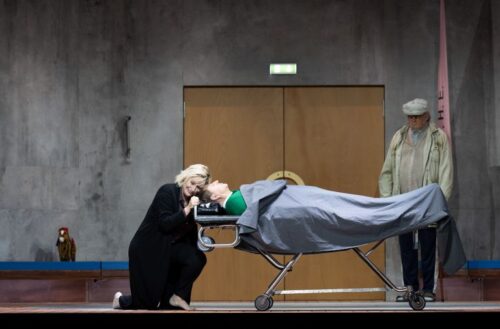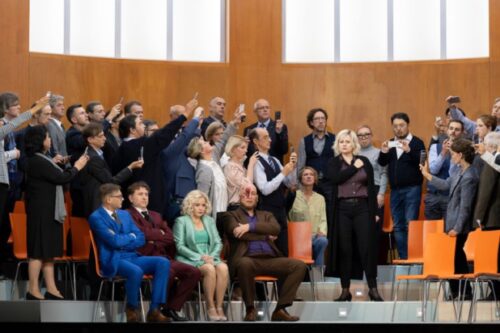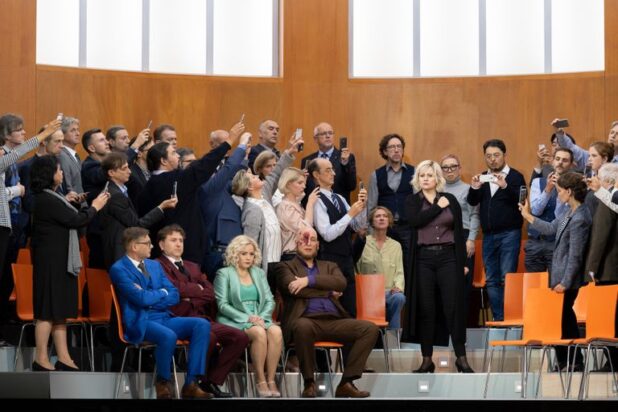 Germany Wagner, Götterdämmerung: Soloists, Staatsopernchor, Staatskapelle Berlin / Christian Thielemann (conductor). Filmed (directed by Andy Sommer) on 9.11.2022 at Staatsoper Unter den Linden but available until 17.2.2023 on ARTE Concert. (JPr)
Germany Wagner, Götterdämmerung: Soloists, Staatsopernchor, Staatskapelle Berlin / Christian Thielemann (conductor). Filmed (directed by Andy Sommer) on 9.11.2022 at Staatsoper Unter den Linden but available until 17.2.2023 on ARTE Concert. (JPr)

Production:
Director, Set design – Dmitri Tcherniakov
Costumes – Elena Zaytseva
Lighting – Gleb Filshtinsky
Video – Alexey Poluboyarinov
Dramaturgy – Tatiana Werestchagina, Christoph Lang
Chorus master – Martin Wright
Cast:
Siegfried – Andreas Schager
Gunther – Lauri Vasar
Alberich – Johannes Martin Kränzle
Hagen – Mika Kares
Brünnhilde – Anja Kampe
Gutrune – Mandy Fredrich
Waltraute – Violeta Urmana
Norns – Noa Beinart, Kristina Stanek, Anna Samuil
Woglinde – Evelin Novak
Wellgunde – Natalia Skrycka
Flosshilde – Anna Lapkovskaja
Erda (Silent) – Anna Kissjudit
Wotan (Silent) – Michael Volle
Dmitri Tcherniakov’s new Berlin Ring cycle held its grip on me, musically, from first note to last and his Konzept was intriguing though ultimately petered out without revealing anything new about what Wagner wanted us to understand from all we had been seeing and hearing over so many hours. During the last minutes of Götterdämmerung we had seen Brünnhilde – with the dead Siegfried on a gurney (previously the treatment table) – berating Wotan for his missteps. I would assume what he has been getting up to bordered on eugenics with his ‘planned breeding’ of Siegfried within E.S.C.H.E. (the research centre) where he has been monitored his whole life and never left.
The stage soon clears and Brünnhilde appears with a bag in her hand going who knows where. She encounters the aged Erda who has the toy Woodbird (from Siegfried) with its fluttering wings in her hand, but she is dismissed. On the back wall is projected Wagner’s proposed Schopenhauer-inspired text for the end of the opera: ‘Were I no more to fare to Valhalla’s fortress, do you know whither I fare? I depart from the home of desire, I flee forever the home of delusion; the open gates of eternal becoming I close behind me now: To the holiest chosen land, free from desire and delusion, the goal of the world’s migration, redeemed from incarnation, the enlightened woman now goes. The blessed end of all things eternal, do you know how I attained it? Grieving love’s profoundest suffering opened my eyes for me: I saw the world end.’ Has Tcherniakov’s Brünnhilde achieved enlightenment, who knows? He has her come to the front of the stage where the architects floor plan for the research centre is seen once again only for Brünnhilde – to a degree – wipe it off the face of the earth and thereby wipe the slate clean.
It all began back in the framework house familiar from before as Brünnhilde gets out of bed from beside the sleeping Siegfried and puts on a robe. In marvellous ageing makeup the three Norns (in their comfy cardigans) come knocking, they are quite debilitated and need walking aids. One even falls asleep during the narration. With Brünnhilde having gone back to bed the Norns wander through the house before sitting at the table and for ‘Es riss!’ (It breaks!), there (naturally) is no rope and they just drop the cups they are holding. Brünnhilde wakes Siegfried up who showers and dresses (pale yellow sweater and light blue trousers). Over breakfast Siegfried gets given the toy Grane (a small piñata) and with his bag already packed he leaves Brünnhilde and the set recedes leaving him ‘smoking’ and skipping around in a pool of light before laying down and that plan of E.S.C.H.E. descends again.
The conference room we have seen before has been upgraded from brown marble to grey and we meet Hagen (red facial blemishes and in brown suit), Gunther (in a blue business suit) and Gutrune (in lime green blouse and black slacks). They are far from dysfunctional and are having a high old time and when Siegfried arrives they initially act as if they are dealing with someone who is mentally disturbed, especially when he presents the Tarnhelm (the cap of electrodes) to great merriment. Siegfried doesn’t need to be drugged to become infatuated with Gutrune who is very happy with his interest in her. There is a lot of sitting around and drinking before Blood Brotherhood is sworn and Siegfried sets off with Gunther to bring Brünnhilde back for him. Hagen, keeping watch, wanders out onto a bare stage and passes by a shabby, near-naked Alberich.
We are then back with Brünnhilde who still has not dressed, Waltraute wanders in wearing a blue raincoat and sits with her on the sofa. They will struggle for the ring and – anticipating Tcherniakov’s ending – Brünnhilde exclaims how she will ‘never renounce love’. Siegfried – chewing again and initially miming to Gunther’s voice – wears no disguise, sits at the table with a Berliner Kindl and some bread and butter before grabbing the ring off Brünnhilde who reluctantly begins to undress.

Act II begins in the very familiar lecture hall with its rows of plastic chairs. Alberich emerges at the back to urge the (sleeping?) Hagen to reclaim the ring for them. He has knitted his son a large pair of woollen socks! Siegfried sneaks up on Hagen and makes him jump when he sneezes. Gutrune now appears totally infatuated with Siegfried who is hyperactive and does some embarrassing ‘dad dancing’ and more skipping (making it frequently uncomfortable to watch Andreas Schager). Hagen calls in the vassals (the employees of the centre) who all sit around laughing heartily. For Siegfried’s confrontation with Brünnhilde – when he stops moving – he will be sitting at the front with Gunther and Gutrune framed by everyone else often standing around and they will take photos and video at one point. As the act ends, the browbeaten Gunther cowers in a corner before Hagen convinces him of what needs to happen and Brünnhilde sings ‘Let Siegfried die, atoning for himself and for you.’
As Act III begins, we see Siegfried in the conference room with a green cap and wearing a robe before he roams the upper level. The Rhinemaidens (who have not aged) are in the ‘Stress laboratory’ and glide around on stools recording things down on their clipboards after Siegfried comes in a green polo shirt with his name on the back. He will laugh off their warning about how the ring is cursed and then the Rhinemaidens leave as Siegfried goes round and round on his stool. We soon realise why Siegfried is dressed as he is because he joins Hagen and his men getting ready to play basketball. Siegfried just drinks water and doesn’t need to be drugged to remember Brünnhilde before getting stabbed in the back by the pole of an E.S.C.H.E. flag. He stumbles through to the Stress laboratory followed by Gunther who is inordinately affected by his plight. Siegfried is laid out on the treatment table and many of those we have seen previously during this Ring cycle come in to grieve for him, including the Rhinemaidens, Norns, Erda and Wotan. Siegfried will be taken through to Brünnhilde who is at the side of the basketball court and the mourners are mystified by her wanting to build a funeral pyre. They leave her on her own with just the toy Grane and – as mentioned previously when discussing the end of the opera – Wotan as she sings ‘Hear my lament, god of gods!’
Closeups of Christian Thielemann during the orchestral passages during this Götterdämmerung – and indeed the entire Ring – reveal him to be the most laidback of conductors and looking content just to coax along the wonderful Staatskapelle Berlin who probably have already been made aware of what he expects. Their performance as a result is perhaps not as propulsive as from some other conductors, though indubitably it has an intense and emotionally expressive grandeur. Thielemann was greatly helped by a superb chorus and the cast of consummate singer-actors. Towering over them all (literally) was Mika Kares’s personal magnetism and booming, yet flexible bass voice as the menacing Hagen. Mandy Fredrich was an unusually vivacious Gutrune in personality and voice (she possibly is a future Brünnhilde) and Lauri Vasar was a suitably lily-livered Gunther. Johannes Martin Kränzle impressed once again in his brief time on stage as Alberich and the trio of Rhinemaidens were as distinctively melodic as they were in Das Rheingold. Noa Beinart, Kristina Stanek and Anna Samuil brought unexpected personality to each of their venerable Norns and Violeta Urmana’s gripping delivery made me briefly forget how tedious Waltraute’s backstory can be.
Anja Kampe was a strong Brünnhilde (again in voice and personality) and believably created a wronged woman who starts off seeking revenge yet fully comprehends the way things must be by the end of her story. Her world-denouncing Immolation Scene heard her – through loudspeakers – at the limit of her abilities but, to her credit, she got through it even if the top of her voice was sorely tested at times. On the other hand, Andreas Schager as Siegfried avoided the most difficult high notes of his role. Tcherniakov creates a trouble character who, oddly, is outwardly more genial than we are used to; however, Schager was the lesser of the actors in this Ring cycle and failed to bring life to Siegfried for me. I wasn’t in the opera house, but vocally Schager also didn’t sound at his ease either and rarely challenged himself, although he had his best moments at the end when he remembered Brünnhilde and bade her farewell.
Jim Pritchard
Previous Berlin Ring cycle reviews can be found here.

This cycle limped to the anticlimactic end that seemed foreshadowed in Das Rheingold and never rose above the level of bathos on subsequent evenings/streams. The concept was not articulated enough to replace the disjunction of what we heard and what we saw. Brünnhilde left alone on stage as the fire danced in Die Walküre, again at the end of Götterdämmerung as the world comes to an end and the cycle prepares to start again. No sword, no forge, no journey down the Rhine. In fact, no idea or image memorable enough to bother thinking about. 4 nights in a rabbit warren with ever more stilted stage pictures and for me little Personenregie to relieve the overall sense of tedium. Tcherniakov told a story but in a way that added nothing to the one that Wagner meant us to see and hear, in reality he diminished it.
In a time when Wagner singing is very much of a muchness in any house, I suppose this one was OK but what made it worthwhile was Thielemann and the orchestra. I commented in Rheingold that I find him a little old style, but I was proved wrong in this instance and not just because I was looking for something positive to outweigh my negative reaction to the production.
If this were Bayreuth it might be seen as work in progress, but I suspect that what we saw is as good as it will get. Viewed online it passed muster, but I doubt that I would travel any distance to see it in the opera house and sadly, for this aging opera attendee, the same can be said for too many of today’s productions. 3 Ring Cycles from Berlin and Bayreuth and 3 cycles that left me thinking whether I ever want to see another!
S&H: I do not disagree with much here except about Personregie, I think the quality of the acting stood out when watching online but would have been missed by many in the opera house. Thank you so much for taking the time to discuss your views in such detail. Jim
Well said Jim! I was there for the second cycle for the Edinburgh Music Review and it was dire! A German opera fan next to me said ‘You know in Germany we don’t feel we get our money’s worth unless we boo the production’! Well, they certainly got their money’s worth at this Ring!
S&H: Thanks Hugh, I am just working my way through the remainder of the new Bayreuth 2022 Ring and will have reviews ready in coming days. Jim
I loved all of these reviews Jim. We travelled from Australia to see this production and I was terribly disappointed. The sets, costumes etc were so drab! Something could have been made of the concept but it didn’t happen here. Some good ideas – Wotan watching, Alberich and Wotan pairing up as old men. Great singing and acting and wonderful music. I was really pleased to see Thieleman – we could watch him from our seats and the orchestra was rightly applauded each night. But a disappointment.